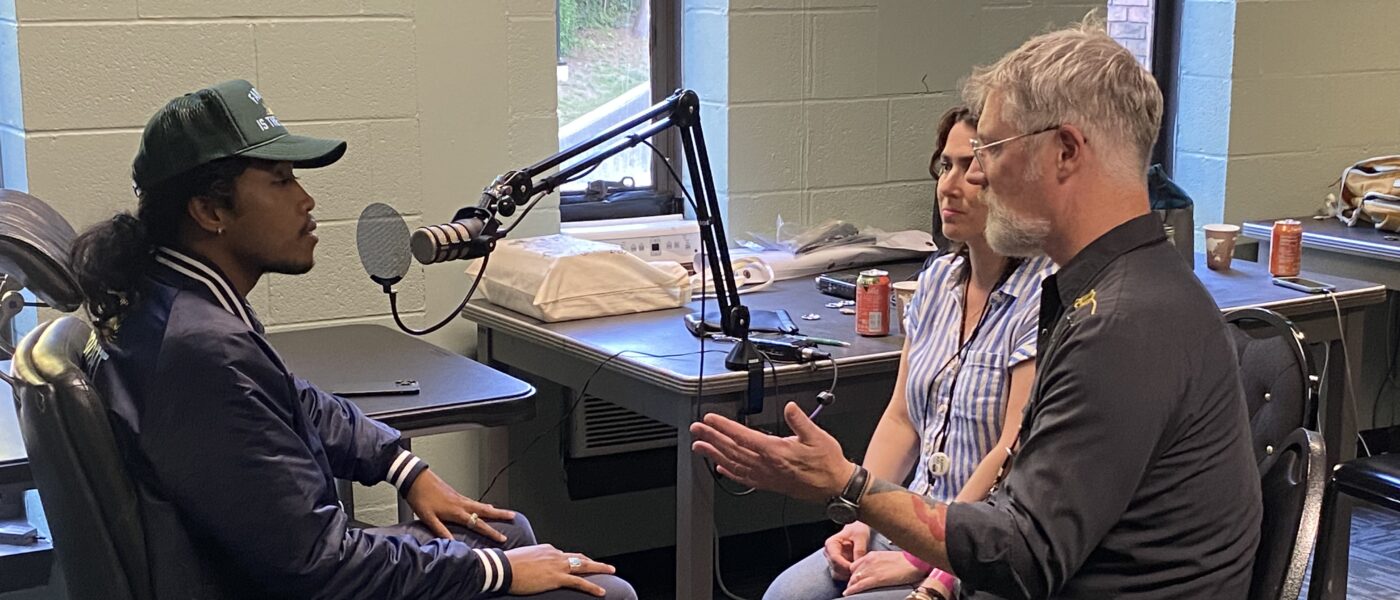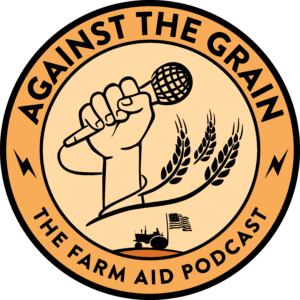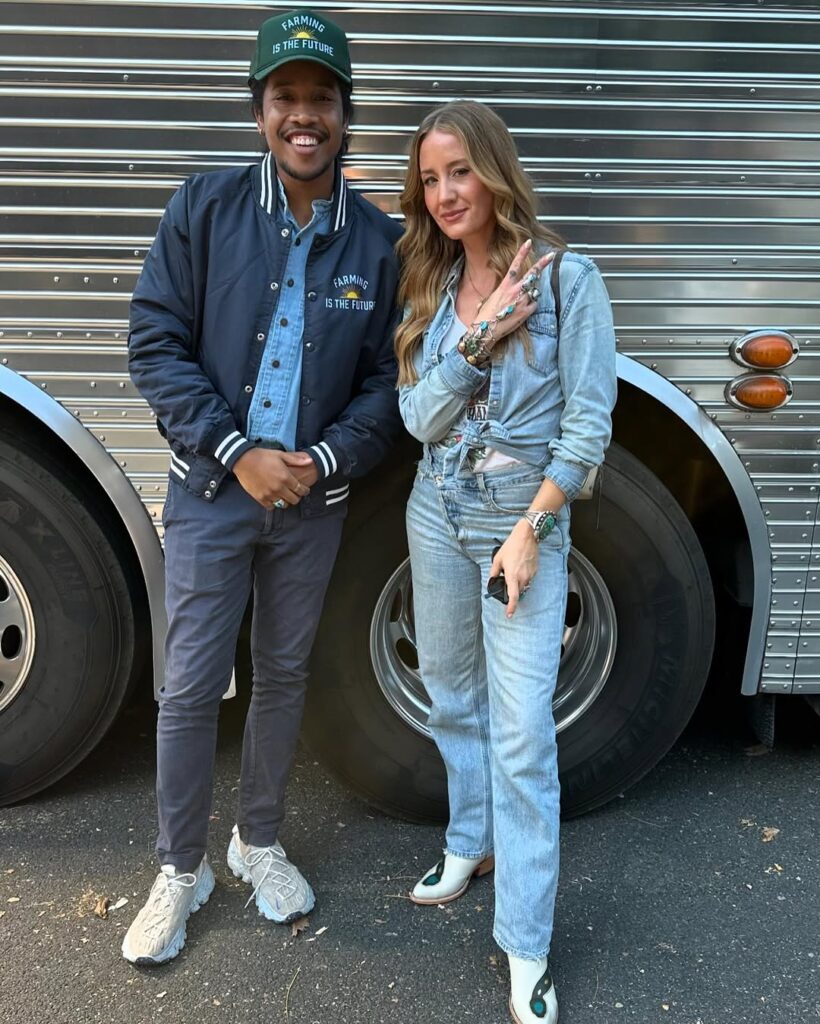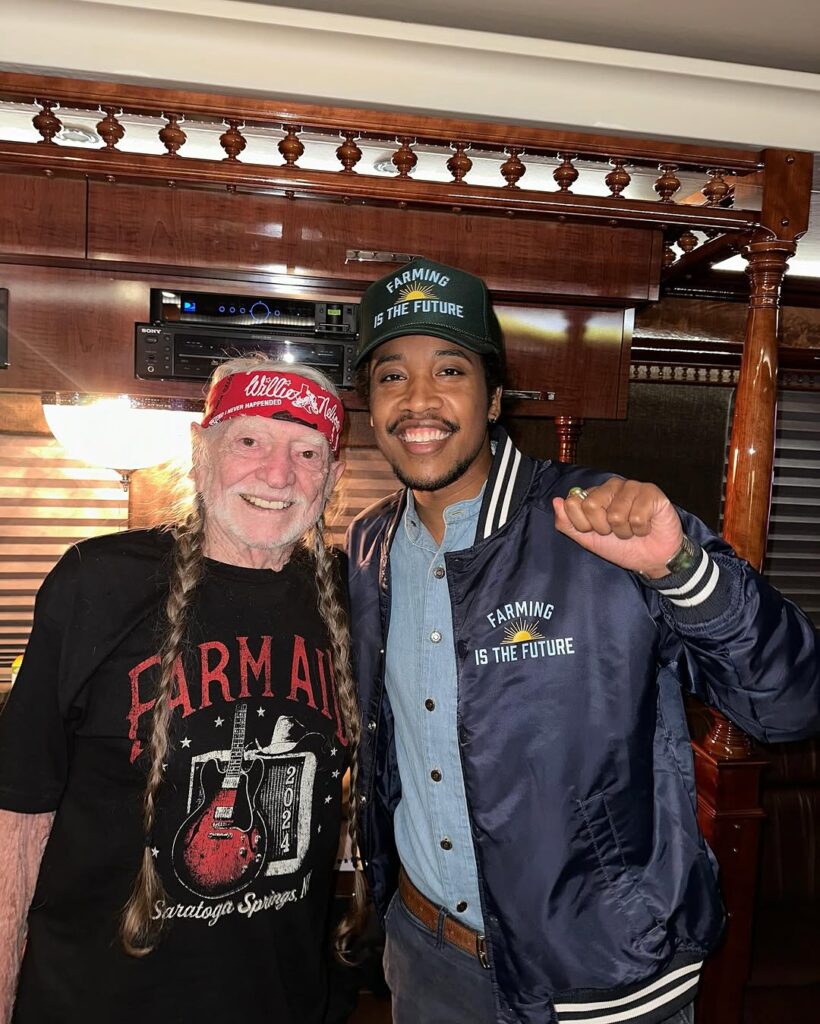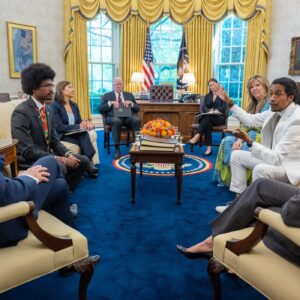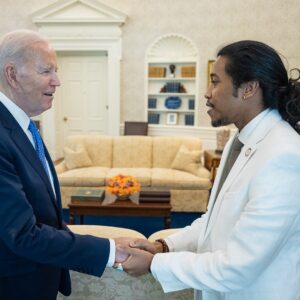In this episode of Against the Grain, join us backstage at Farm Aid 2024 in Saratoga Springs, New York, for an interview with Tennessee State Representative Justin Jones. Farm Aid Board Artist Margo Price invited Representative Jones to join us in Saratoga Springs, and we caught up with him after he and Margo returned from a panel in the HOMEGROWN Village.
- Justin Jones with Margo Price at Farm Aid 2024
- Justin Jones with Willie Nelson at Farm Aid 2024
You may know Representative Jones already. He’s one of the two Tennessee state representatives expelled from the House during a debate over public safety in the wake of a horrific school shooting in Nashville. In a special election, Jones and his colleague Justin Pearson were quickly returned to their seats in the House. We were excited to talk to Jones because, as he tells it, he was put on the House Agriculture Committee as a punishment. Justin illustrates how bipartisan work is possible when issues are humanized and how food and agriculture are some of the issues that transcend usual divisions in the legislature.
Listen to the episode below. And, make sure to subscribe in your podcast app of choice!

Justin Jones
Justin Jones is an activist, organizer, legislator, representative, minister, community leader, environmentalist and gun violence prevention advocate deeply committed to doing the justice work required to move Tennessee and our nation forward. Justin was elected in 2022 to represent the people of District 52, a culmination of years of advocacy work around Medicaid expansion, racial justice, police accountability and the Green New Deal. He is deeply embedded in a tradition of resistance that comes from his familial and movement ancestors who ground and guide his work. Justin was expelled from the Tennessee legislature, daring to put purpose before title, and bringing a moral conscience to the deliberative process which puts the lives of kids against the proliferation of firearms. Justin is a leader for the next generation and the next several to come, and brings past, present and future into the halls of power with him. Justin is a relentless fighter for our collective freedom and an apologetic voice for a South that will rise anew.
Learn more about Representative Justin Jones
Watch Justin Jones speak after being silenced in the Tennessee legislature
Watch Videos Related to this Episode
Mavis Staples performs “If You’re Ready (Come Go With Me)” at Farm Aid 2024 in Saratoga Springs, New York.
Black college students take a leadership role in the civil rights movement as lunch counter sit-ins spread across the South. “Freedom Riders” also try to desegregate interstate buses, but they are brutally attacked as they travel.
Against the Grain Bonus Episode: Justin Jones
FOLEY: We are so glad you’re here for another episode of Against the Grain.
KURN: I’m Jessica Ilyse Kurn.
FOLEY: And I’m Michael Stewart Foley. If you’re a first time listener, welcome. In this episode, we’ll be sharing a powerful interview we recorded at our annual festival that took place in Saratoga Springs, NY, this past year. Tennessee State Representative Justin Jones was introduced to us by Farm Aid board member Margo Price.
KURN: And even if you aren’t from Tennessee, you may have heard of Representative Jones. He was on the national scene quite a bit over the last two years as he unapologetically advocated for his district.
JONES: Hi, my name is Justin Jones. I serve as the youngest Black representative in my state of Tennessee and also represent the most diverse district, which is District 52 in Nashville, and I serve as a member of the Agriculture Committee in Tennessee, which is my connection. I got introduced to Farm Aid from Margo Price. Really excited to be here.
FOLEY: His political career has been pretty wild so far. First he was expelled from the Tennessee legislature in April 2023 during a debate about public safety where he called for gun reform after a horrific mass shooting at a Nashville school.
KURN: Although Justin won a special election to be returned to the Tennessee House days later, he was once again silenced during another debate on public safety. He felt the censure was in retaliation for proposing a vote of no confidence against Republican House Speaker Cameron Sexton.
FOLEY: He gave an overview that day right after all this went down at the house. Take a listen.
JONES: We have an update: I just left the House chamber. The Democrats walked out of the chamber in protest after Cameron Sexton decided to abuse his gavel and call for a vote so that I could not even speak for the rest of the session. He said it was because of speaking off topic and so what we’re seeing is this misapplication, this abuse of rules under the leadership of Speaker Cameron Sexton. Members of the public were taken out of the gallery. I was told I was gonna be silent. Our caucus walked out in solidarity because what’s happening is not democratic, it is authoritarianism. It’s very troubling what we’re witnessing here. You can see that the Capitol, um. It is surrounded, you know, by troopers and this does not look like a democratic body anymore. It is very troubling the trajectory that we’re on and really what he was trying to do was silence by vote of no confidence, but what he does not know is that he’s only guaranteed that more people will show up because it shows how fragile his power is, his attacks on democracy, his attacks on dissent, and will not go unchallenged.
KURN: As you’ll hear in our interview with Justin, Speaker Sexton’s retaliation has taken many forms, some of which have backfired.
JONES: My story about being on the agriculture committee is a little interesting. So I was put on that committee by the Speaker of the House as what he intended to be a punishment, um, he put me as the only non-rural member on our committee thinking that I would be at a disadvantage, but really it’s been the most amazing place to fight for food justice as a critical part of our movement. To look at organizing in solidarity between urban and rural communities, looking at it as a place to advance policies of the environment. Mental justice, um, you know, advancing policies of trying to support young farmers and Black farmers and brown farmers, trying to really diversify what agriculture is in our state. And so, what was intended to be a punishment has actually been one of the greatest gifts that the speaker gave me and it’s led me here to Farm Aid now. So I’m really excited to be on the committee.
KURN: After a really rough start, when the actual work started to take precedence, he was able to make a lot of progress with his peers.
JONES: It has been a place of great bipartisanship that I’ve seen. Because they didn’t expect me to go down to their districts to some of these rural districts and meet with farmers and hear about things like the right to repair their own farm equipment. So I was the one who sponsored our Agricultural Equipment Bill. I was the one who, um, was the only member of our committee to go down to Murray County, which is a rural county, meet with cattle farmers about the pollution of the Duck River (the most biodiverse river in North America) would mean for their cattle farms. And so really building, um, connections and building coalitions to move our state forward as a member of that committee.
FOLEY: I thought that this was so interesting because the day before we interviewed Justin we heard from so many farmers and organizers at Farm Aid’s Farmer Forum who were talking about the same things: how to transcend division that’s so often constructed in the media by labeling people left and right, rural and urban, red state and blue state. So we asked Justin about his experience in confronting this kind of dynamic in Tennessee and in the South.
JONES: I think what this is really about is like so often we are told that southern states like Tennessee are stagnant, that this is what we’re left with and oftentimes as I travel I hear people who write off the South, but what I really believe is that through work like what we’re doing in Agriculture Committee, we are building a new South, and one that is multiracial, multi-generational. You know that is rooted in care for each other, rooted in racial justice, rooted in policies that uplift as opposed to beat down, and that are rooted in solidarity as opposed to fear and division and so that’s the new South that we’re building.
Being on this committee has really opened my eyes to what is this movement of folks who are told that we’re so different or that we are, you know, supposed to have these stereotypes of each other. What does it mean when we come together and the system of what I call “plantation politics” collapses because they don’t know how to maintain their hold on power anymore. My message to folks across this nation is that, you know, let us not write off the South because if we wanna change this nation it’s going to come from the South. You know, W.E.B. Du Bois says “so goes the South, so goes the nation” and so if we wanna change this nation we have to invest in the South. We have to support the South and really this is also an issue of multiracial democracy. If we study history in Tennessee Black farmers were put off their land, put off their way of producing food for themselves and their families for registering to vote and so we’ve seen food and access to food weaponized in states like Tennessee.
And to this day, you know, my district is the most diverse district, a majority Black and brown district. It is not by accident that my district is a food desert. That’s not an accident that is strategic and that is intentional, and so you know, the more we can build coalitions with folks who are producing our food and also talk about urban farming and really address the trauma that a lot of communities feel when it comes to agricultural work and seeing that as a source of healing for our people is going to be key in advancing us forward.
FOLEY: This is a crucial point as a new administration takes office. It’s important to remember that working together brings about the most success.
KURN: For sure, even when it feels hard, like there are no commonalities or middle ground, we have to work to find them, so we don’t get stuck.
Justin also talks about the power of music and movement organizing, and this is so important to us because of course, building community among farmers, artists, and the public is what Farm Aid is all about.
JONES: I mean our movement would be nothing without music. I actually come from a place called “Music City,” Nashville. I think music is that great connector; music is a way to amplify our collective voice. Music is a way to connect to ancestors as well. Like I’m really excited to hear Mavis Staples, one of the voices of Civil Rights songs: “We shall not be moved.” I mean this is what music has done.
Music has been a healing source for us because how do we sustain in this work when you stand up against multinational corporations that wanna have a monopoly on food that is going to get tiring. It’s going to burn you out and so music can undergird us. It can bring us together in spaces I really believe are necessary to sustain us in this work. It gives us a vision. It gives us joy to sustain, and it also gives us healing and undergirds us to keep going forward.
KURN: Your hat says “farming is the future.” Could you talk a little bit about that?
JONES: Being an agriculture committee there is this campaign that my office has initiated because we want to get more young people into farming. One of my initiatives in the legislature has been trying to uplift young farmers and reach out to young farmers, and make sure that they have, you know, we remove the barriers that keep young farmers from being able to access a sustainable living. So farming is the future. It’s been our past, present, but it also is gonna be vital for our future, because it’s also, you know, about a connection to land. And my grandmothers would always tell me: they said, “you know, maybe if you care for the land, the land will care for you.” And that’s the lesson that will guide us into this future where we see people who see the land as exploitable as discardable. I know it is vital for us to survive in the future and so to me farming is something that our generation is taking up and you know hopefully we’ll address
FOLEY: One of the things I most appreciate about Justin’s analysis is that it is rooted in this deep understanding of history, not only American history and Tennessee history, but in the history of the Civil Rights Movement and all of the movements that came out of it. One of Justin’s mentors is Diane Nash, a Civil Rights legend who led the lunch counter sit-ins in Nashville and the Freedom Rides.
KURN: Yeah, it’s clear that even when faced with fierce opposition, not unlike the Civil Rights activists faced in the 1960s, there’s inspiration to be drawn from those who went before us. And I appreciate that he emphasizes the strength we gain when we work together and how the issues that seemingly impact one group ultimately touch us all. This type of thinking is important as we continue to work in our polarized country and political system.
JONES: To those who are even on the other side of the aisle from me, this issue of food justice. When we fight for food justice, we’re fighting for them and their children too. And so this is an issue of not left or right, but it really is an issue of right and wrong. Of who we want to be as a nation and if we you know, at the root I believe we can be a nation that cares for others, that nourishes. So many of our kids are in fight or flight mode, but we want them to be able to flourish. We want them to be able to be their whole selves and the key to that grounding is being able to have nourishing food to sustain you and to give you health. And so that’s the future we’re fighting for.
FOLEY: But as Justin points out, it’s an uphill battle to stay the course when the dominant narrative and power structures are pitted against you.
JONES: In Tennessee we have a saying that a dying mule kicks the hardest and so I think that the reason that they’re deflecting so much is because they recognize that they’re losing power. In my district, I’m the first non-white representative of my district. I’m the youngest in our legislature and obviously last year a lot of people may know that we were expelled, but you know the reason we’re exposed is because we represent a movement that represents a new South. Southern segregationists would have a saying they said the “South is gonna rise again.” And I reject that. I say: No. The South is going to rise anew!
We represent that when we center communities that are impacted and when we center our solidarity across multiracial, multi-generational, multi-faith lines that we are building something new and so every time they attack us, I mean that’s confirmation that we are actually on to something that we are effective, that we are building something. Because if we were not affected they would not try so hard to divide and isolate us from each other and so I think my hope lies in the fact that we’re not in this alone. I’ve seen so many coalitions, even working on the Agriculture Committee, that have been able to build this regional solidarity where we’re seeing our issues as intertwined. And even on the Agriculture Committee when this corporation came from out of state to try and pollute the river in one of these rural districts, you know, these folks down there who I walked into their house and they’re watching Fox News and we were able to talk. And they said: “You were the only member of this committee who came down to talk to us, and we don’t vote, but you’re the one who cared to come down here.” That’s to me what gives me hope. We’re creating a movement of care for each other and it’s removing the caricatures that they create of us. They want people to be afraid of a representative like me because they think I’m, you know, some radical, but really it’s not radical to say that people should have food to eat. What is radical is a system that profits off of starvation of people. I hope that you know when we look down on this time in history that we know that we’re on the right side of history. That future generations will be proud of where we stood in this time and that we’re willing to stand up when we’re facing some of the most powerful industries, the most powerful special interests in this nation. But we’re willing to stand up because we were fighting for a nation that they would inherit in the coming years.
KURN: That was “If You’re Ready (Come Go with Me) from Mavis Staples’ Powerhouse Farm Aid 2024 performance.
FOLEY: She was spectacular that day, as always. Jess, my takeaways from this interview with Justin Jones are that standing up to industry and special interests is not easy, but it’s what Farm Aid has always done and will continue to do. As John Mellencamp likes to say, “Farm Aid has been slugging it out for farmers for 40 years.”
KURN: Corporations have enormous power and ever increasing political influence over every step of our food system, farm to fork. They manipulate the markets, push down prices paid to farmers, and unfortunately in so many cases drive those farmers out of business. In season two, we’ll cover how this hurts the farming, ag and ranching communities.
FOLEY: And we’ll talk about how that impacts consumers as well as our environment. No one, including our planet, comes out of a corporate concentration scenario unscathed except the corporations.
KURN: Indeed. We want to thank Representative Justin Jones for sitting down with us backstage at Farm Aid 2024 and for all the work he does.
FOLEY: What did you think of this episode? Let us know by emailing us at podcast@farmaid.org or give us a shout out on Farm Aid social media, which is @Farmaid on Instagram, Facebook, Twitter and threads. Don’t forget to check out our YouTube channel too, where you can watch almost 40 years of performances and other content.
KURN: And, I know we always say it, but it really means a lot to the podcast if you would share this with your friends and subscribe on your podcast app of choice. Oh, and take a minute to give us a rating.
Against the Grain was written and produced by us with sound editing by Endhouse Media and direction from Dawn Sorokin. Thank you so much to Micah Nelson for composing and performing our theme music.
FOLEY: And thank you to all the farmers out there! We’ll talk to you next time.
